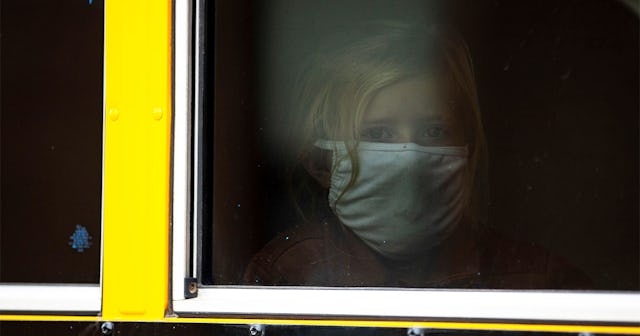More Than Half A Million Children Have Had COVID In The U.S.

The AAP says COVID cases in children are on the rise
More than 500,000 children in the U.S. have been diagnosed with COVID-19, according to an American Academy of Pediatrics report published this week. With the 2020-21 school year now in session across the country, the rate of cases among children is also on the rise.
An increase of 16 percent of cases were reported among kids from Aug. 20 to Sept. 3 — 70, 630 cases in total — with the largest increase occurring in six states: Indiana, Kentucky, Missouri, Montana, North Dakota, and South Dakota. The AAP says the official total of children diagnosed with COVID-19 is 513,415, and as many as 103 children have died due to the virus. The pediatric cases represent 9.8 percent of the more than 6 million cases overall in the country.
“These numbers are a chilling reminder of why we need to take this virus seriously,” Dr. Sara Goza, president of the academy, said in a statement, per NBC News. The AAP and the Children’s Hospital Association compiled the data of children of varying ages as reported by 49 state health departments, New York City, Puerto Rico and Guam.
Many schools across the U.S. have already experienced outbreaks of the coronavirus and have had to shut down temporarily — some within the first day or two of reopening. In New York, new cases are up more than 25% compared to two weeks ago.
“A smaller subset of states reported on hospitalizations and mortality by age, but the available data indicated that COVID-19-associated hospitalization and death is uncommon in children,” the AAP report states.
Some COVID-positive children have experienced a pediatric illness linked to COVID-19, Multisystem Inflammatory Illness in Children (MIS-C), which is also or sometimes referred to as PMIS. The CDC describes it as “a rare but serious condition associated with COVID-19” that sometimes presents after a COVID illness or after contact with someone with COVID-19. Instead of attacking the lungs like COVID does in adults, this rare syndrome can trigger deadly cardiac complications in kids.
So far, children haven’t experienced the worst outcomes of the disease at the same rate as adults — which could change as the school year wages on — but health experts are reminding everyone that children can easily spread the virus to more vulnerable family members.
“While much remains unknown about COVID-19, we do know that the spread among children reflects what is happening in the broader communities,” Goza told NBC News. “A disproportionate number of cases are reported in Black and Hispanic children and in places where there is high poverty.”